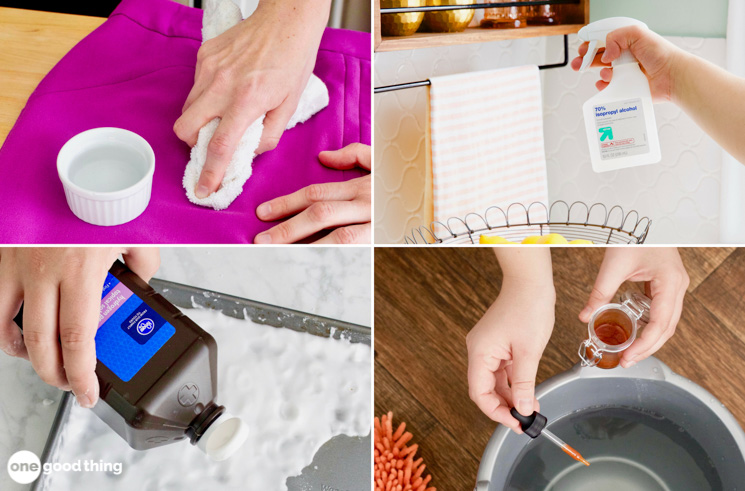
If you’ve been following my blog for a while, then you’ve probably already noticed that many of the same ingredients pop up again and again in my homemade cleaning solutions. These superstar cleaning ingredients include things like baking soda, vinegar, and essential oils, just to name a few. But the two cleaning ingredients we’ll be talking about today seem to be among the more mysterious: hydrogen peroxide and rubbing alcohol.
I have received a lot of questions about these two over the years, so to help clear up the confusion and get us all on the same page, I thought it was high time I wrote a blog post about it! Today I’ll be covering everything you’ve been wondering about hydrogen peroxide vs. rubbing alcohol, including what they are, how they are different, what uses each one is best suited for, and more.
Related: This Is What You Need To Know About Cleaning Vs. Disinfecting
And if you’re interested in learning about more about hydrogen peroxide specifically, be sure to check out my eBook Hydrogen Peroxide Magic! You can buy it in my shop, or download it for free if you’re an OGT Plus member!
Hydrogen Peroxide vs Rubbing Alcohol: The Basics
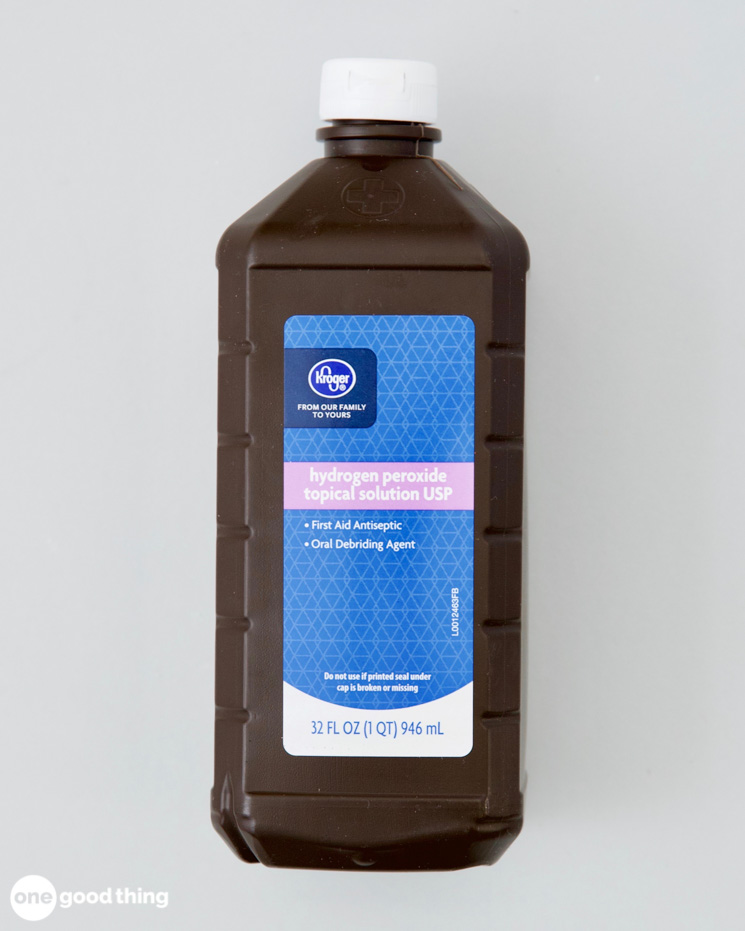
Hydrogen peroxide (H2O2) is a chemical compound made up of two hydrogen molecules and two oxygen molecules. It is a naturally occurring substance produced in small amounts in the bodies of many animals, including humans. It has antibacterial, bleaching, and lightening properties.
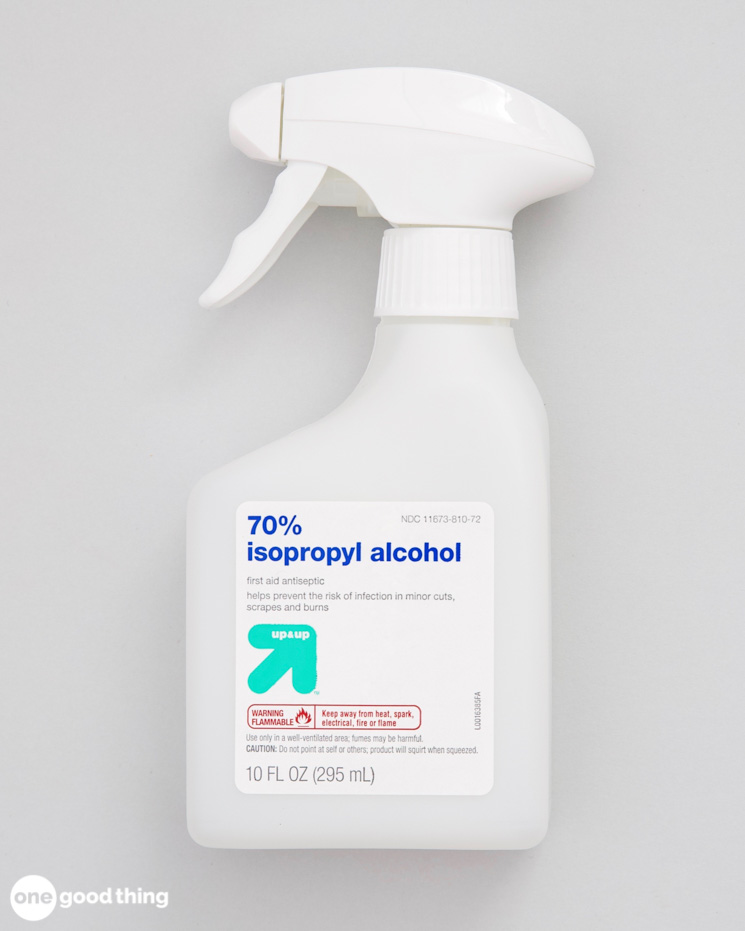
Rubbing alcohol, also referred to as isopropyl alcohol, is a different chemical compound entirely (C3H8O, for the curious!) It is a highly effective solvent, dissolving a wide range of compounds including oils. It has antibacterial qualities and evaporates quickly.
Both hydrogen peroxide and rubbing alcohol…
- Are antiseptics
- Are naturally occurring
- Can be found in the pharmacy section of most grocery stores
- Can be used for household cleaning

Should I Use Hydrogen Peroxide Or Rubbing Alcohol For Cleaning Wounds?
When it comes to first aid, it may surprise you to learn that you’re better off using neither! While both substances have antiseptic qualities, neither is a perfect solution for treating wounds.
In the past, doctors commonly recommended using hydrogen peroxide to clean wounds. But today, most medical professionals advise against it because peroxide attacks healthy cells as well as bacteria, which can slow the healing process.
Rubbing alcohol is also not advisable to use for cleaning wounds. While it can eliminate bacteria, it is almost certain to burn your skin as well. The burning effect can lead to swelling, itching, and inflammation that can make a bad situation even worse!
So if you have a wound that needs cleaning, keep your bottles of hydrogen peroxide and rubbing alcohol in the cupboard! Instead, rinse the wound with cool water and wash around the area with a mild soap, then cover the wound with a bandage to keep it protected while it heals.
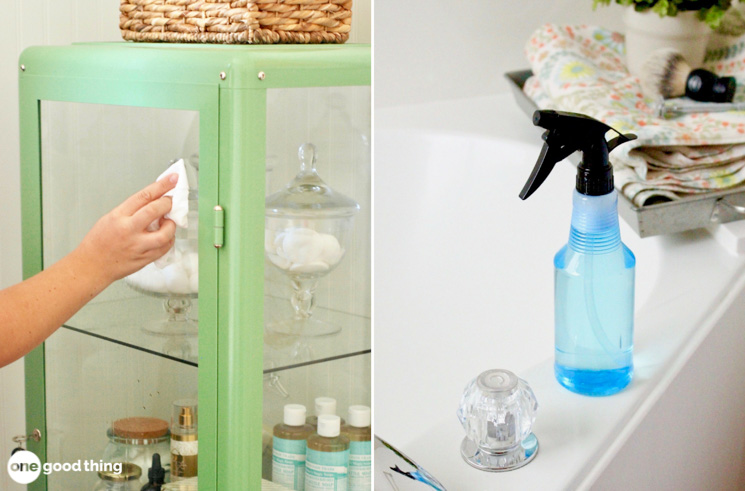
How Do I Use Hydrogen Peroxide & Rubbing Alcohol?
While they aren’t great for cleaning cuts, you can use hydrogen peroxide and rubbing alcohol to clean all sorts of other things! They are two of my very favorite cleaning ingredients, and there’s no shortage of ways you can use them around the house.

Rubbing alcohol makes a great solvent and evaporates quickly, making it an excellent choice for tackling greasy and sticky messes. It’s also useful in situations where you don’t want to leave any streaky residues behind, like when you’re cleaning shiny appliances, windows, or mirrors.
Check out these links for more uses for rubbing alcohol:
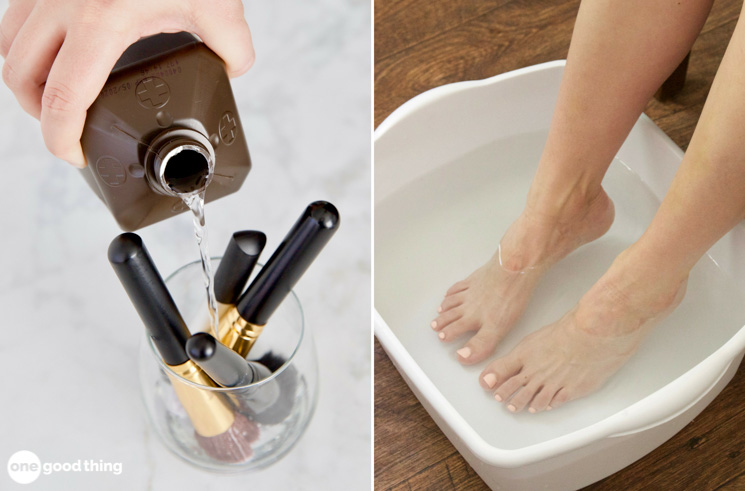
Hydrogen peroxide disinfects, deodorizes, whitens, and brightens. It’s great for washing fruits and veggies, sanitizing sponges, and even removing laundry stains!
Check out some of my favorite uses for hydrogen peroxide at these links:
- 7 Ways Hydrogen Peroxide Will Help You Look Your Best
- 35+ Uses For Hydrogen Peroxide You’ll Want To Know About
- How To Remove Blood Stains With Hydrogen Peroxide
DIY Cleaning Products With Hydrogen Peroxide & Rubbing Alcohol
I mentioned at the beginning of this post that I’ve posted a lot of cleaning recipes with both of these ingredients. And as you’re about to see, that wasn’t hyperbole! ;-) Here are some of my favorite homemade cleaning products featuring these powerhouse cleaning ingredients:

Hydrogen Peroxide Cleaners
- Kitchen & Bathroom “Miracle” Cleaner
- Homemade Oxygen Bleach
- Daily Shower Cleaner
- My Ultimate Stain Remover Spray
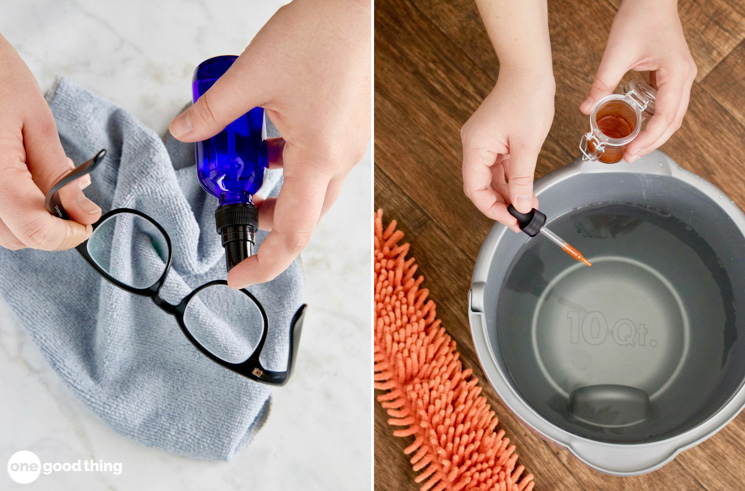
Rubbing Alcohol Cleaners
What’s your favorite way to use hydrogen peroxide or rubbing alcohol at home?
Spring Cleaning Sale
Ready to do some spring cleaning and freshen up your home? Save on all your favorite natural cleaning products during the Spring Cleaning Sale going on now in the By Jillee Shop!
Save 20% on my brand new microfiber cleaning cloths, my bestselling Simple Clean Essential Oil Blend, and much more!
Offer ends 03/28/21 at 11:59 PM MDT. No coupon codes necessary, discount reflected in the price.
Want To Save Even More?
OGT Plus members will enjoy an extra 10% off during this sale for a total of 30% off! (Not a member? Join OGT Plus today!)
































I use rubbing alcohol (70%) with a spray nozzle to sanitize my face masks between washings. I spray both sides liberally and hang to dry (dry within minutes of spraying) as well as cording (elastic). I also sanitize the bottoms of shoes coming in the house, to cut down on germs. I use hydrogen peroxide in my bleach cup in the washer, in leu of bleach. The hydrogen is less caustic, has no after-smell and works as well as bleach. On occasion, I will use bleach……
Please log in or create a free account to comment.I also recently discovered peroxide is also great for attacking stray cosmetic stains on my silk pillowcase.,I sometimes will use some liquid soap with an old toothbrush and then pour peroxide over it. It works very well.
Please log in or create a free account to comment.Why is rubbing alcohol called isopropyl alcohol? Is there a reason why? I believe I know the answer and I would like you to use only the term Isopropyl because of it.
Please log in or create a free account to comment.BTW I love isopropyl alcohol and your articles. Where will I see a response to this question because I have asked it before and have never seen a response.
The difference between rubbing alcohol and more pure forms of isopropyl alcohol is that rubbing alcohol contains denaturants which make the solution unpalatable for human consumption. … In documents cited by the CDC, “rubbing alcohol” is defined as 70% isopropyl alcohol and 30% water.
Please log in or create a free account to comment.from the web…. is that what you’re referring to?
Jillee, I love your articles. They are always so relevant and informative. Many thanks!
Please log in or create a free account to comment.Thanks Sue!
Please log in or create a free account to comment.Hydrogen peroxide will take out scorch marks (I know I’m not the only one that left an iron in one area just a bit too long!) – I used a cotton washcloth and a bowl of peroxide and just kept dabbing and gently rubbing until the scorch mark was gone. I was ironing some tough wrinkles out of a cross-stitched piece I had just finished and my husband decided that he needed to talk to me at that exact moment…It took a while, but not as long as that piece took to MAKE!!
Please log in or create a free account to comment.I agree .Peroxide is the best for blood stains. It tends to sting my hands, so I saved a spray bottle container that originally contained it a refill it. I have had success on even dark fabrics just spraying it. Older blood stains are tougher. They are easier to treat if they are fresh. I can launder a few days later after pre- treating and the stain will come out.
Please log in or create a free account to comment.I use peroxide to remove blood stains before laundering. Works great on fresh blood, but will even remove dried blood from fabrics. I have used it to clean wounds, but won’t after reading this post.
I use alcohol to clean my glass stove top. Cuts through greasy residue for a streak free shine. I also use it to remove marker from plastics or marker boards. It also works great to spot clean formal wear. My daughter had something (body oil, maybe) on her fingertips when she tried on her prom dress & it left finger marks on the chiffon of the dress. I spot cleaned it with alcohol & then hit those spots with the cool setting of a hair dryer. It removed the spots without leaving any water marks on the dress.
I’ve used both to spray my kitchen counters if raw meat leaks on it.
Please log in or create a free account to comment.